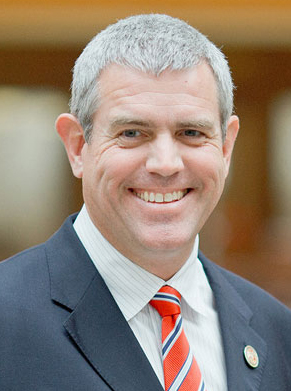
EDITOR’S NOTE: This article has been updated to clarify the sequence of events that led to changing the state flag.
JACKSON, Miss. (BP) – When Mississippi raised its new state flag this week, the banner did not bear the Confederate battle emblem – a symbol ditched six months ago by state lawmakers. A prominent Mississippi legislator says the SBC helped influence the change with its 2016 resolution on the Confederate battle flag.
Philip Gunn, speaker of the Mississippi House of Representatives, attended the 2016 SBC Annual Meeting in St. Louis amid a personal struggle to determine how Scripture applied to the debate over the Confederate emblem. A longtime Southern Baptist but relative SBC annual meeting novice, he found himself at the St. Louis meeting by virtue of his position as chairman of the Southern Baptist Theological Seminary board of trustees. He had concluded the Confederate symbol hindered the Gospel’s spread, but he was seeking confirmation of that conclusion.
When messengers adopted a resolution calling Christians “to discontinue the display of the Confederate battle flag as a sign of solidarity of the whole Body of Christ,” it was just what Gunn needed.

“I felt like I had some backup at that point,” said Gunn, a Republican, adding: “That was just kind of an affirming moment for me because I was struggling to make sure my reading and understanding of Scripture on the issue was correct. When you have theological and spiritual giants like there were in that room that rise up and say the same thing, it just affirms what I had understood.”
Gunn returned to Mississippi emboldened to change the state flag – a quest that culminated Jan. 11 when the new flag, which bears a magnolia and the phrase “In God We Trust,” was hoisted above the state capitol.
Gunn’s push to change Mississippi’s flag began in 2015, after a white supremacist gunman, who had posed in photos with the Confederate emblem, slaughtered nine black Christians at Emanuel African Methodist Episcopal Church in Charleston, S.C. Gunn told media the Confederate symbol was a point of offense to many and urged legislators to discuss Mississippi’s state flag, which then included the emblem. Deadly riots two years later at an alt-right rally in Charlottesville, Va., prompted more discussion of a flag change.
Finally, the May 2020 death of George Floyd, an unarmed black man, while in the custody of Minneapolis police, and subsequent demonstrations moved Mississippi lawmakers to act on changing the flag. Gunn knew it would be a heavy political lift, and he was thankful when Mississippi Baptists supported the flag change.
Mississippi Baptist Convention Board Executive Director Shawn Parker and a team of other Mississippi Baptist leaders issued a statement in June that encouraged “our governor and state legislature to take the necessary steps to adopt a new flag for the state of Mississippi that represents the dignity of every Mississippian and promotes unity rather than division.”
Ligon Duncan, chancellor of Reformed Theological Seminary in Jackson, also issued a statement at Gunn’s request.
Following the statements from evangelical leaders, the Mississippi House voted June 27 by the requisite two-thirds majority to allow introduction of a bill changing the state flag even though the deadline for submitting bills in last year’s legislative session had passed. The next day, it passed a bill authored by Gunn discontinuing use of the previous flag and establishing a commission to design a new flag.
Mississippi voters affirmed the new flag on Election Day, and the legislature codified that vote with a bill making official the new flag.
Ronnie Floyd, president of the SBC Executive Committee, called it “humbling and amazing” that God used Southern Baptists to influence Mississippi’s flag change.
“Through the most recent years, the SBC has repeatedly stood against individual and systemic racism,” said Floyd, who served as SBC president when the Confederate flag resolution was adopted. “It is quite humbling and amazing to know our Convention’s stand in 2016 regarding this issue influenced the change in the Mississippi state flag. I am also very thankful for the churches of our Mississippi Baptist Convention who influenced this decision in their state and also stand with us to commit ourselves to eradicating racism across our nation.”
The SBC’s Confederate flag resolution cited Floyd’s call to “rise up and cry out against racism that still exists in our nation and our churches.” It also urged “fellow Christians to exercise sensitivity so that nothing brings division or hinders the unity of the Body of Christ to be a bold witness to the transforming power of Jesus.”
An initial version of the resolution proposed by the 2016 SBC Resolutions Committee called for “sensitivity and unity” regarding display of the Confederate battle flag. The draft asked Christians who display the flag “to consider prayerfully whether to limit, or even more so, discontinue its display.” But former SBC President James Merritt proposed amending the resolution to take a stronger stance against the flag, and his amendment was adopted.
Arguing for his amendment, Merritt said, “This is not a matter of political correctness. It is a matter of spiritual conviction and biblical compassion. We have a golden opportunity to say to every person of every race, ethnicity and nationality that Southern Baptists are not a people of any flag. We march under the banner of the cross of Jesus and the grace of God.”
Gunn voted both for Merritt’s amendment and passage of the final resolution. He knows some Christians disagree with his conclusion on the flag, and he told BP he’s not making a person’s stance on the Confederate battle symbol a litmus test of their commitment to Christ or His Word. Yet for Gunn, the right decision seemed clear – both for the SBC and the state of Mississippi.
When fellow believers challenge Gunn’s stance, he asks them, “Would you put that emblem on your t-shirt and go try to witness to people and share the Gospel?” Most say no, Gunn said, “because they know that symbol has been coopted by some who wish to advocate hatred, and they know that would be inconsistent. It’s hard to stand there and tell a man that ‘God loves you and I love you’ when you’re promoting that.”

















